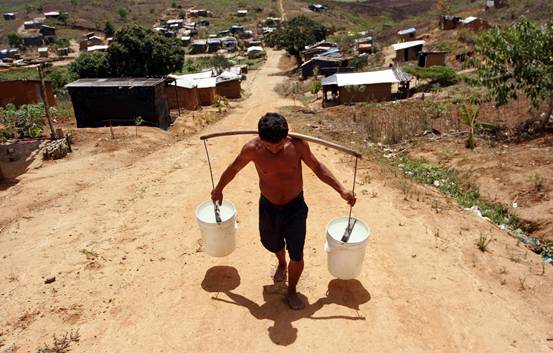Increasing global demand for energy will affect the already acute fresh water shortage, according to the latest United Nations World Water Development Report (WWDR) launched in Tokyo Saturday on the occasion of World Water Day.
The report highlighted a glaring lack of coordination between energy and water management [...]]]>
Increasing global demand for energy will affect the already acute fresh water shortage, according to the latest United Nations World Water Development Report (WWDR) launched in Tokyo Saturday on the occasion of World Water Day.
The report highlighted a glaring lack of coordination between energy and water management systems, despite the fact that places where people have inadequate access to water largely coincide with those where people have no electric power.

A man hauls water at the Chico Mendes landless peasant camp in Pernambuco, Brazil. Credit: Alejandro Arigón/IPS
More than 750 million people in the world have no access to clean water, and more than a billion people are not connected to an electric power grid.
Improving access to those vital resources means recognising the interdependence of water and energy for sustainable development, said Irina Bokova, director-general of the U.N. Educational, Scientific and Cultural Organisation (UNESCO).
Energy production accounts for roughly 15 percent of water withdrawal annually. By 2035, that number will rise to 20 percent due to population growth, urbanisation, and changing consumption patterns.
Similarly, declining water resources also have direct repercussions on the demand for electricity, which is expected to rise by 70 percent by 2035, mostly due to developments in India and China. Already those two countries are home to the largest number of people without access to water: 108 million in China and 99 million in India wake up every morning knowing it will be a life or death search for that precious resource.
Electric power plants, which produce 80 percent of the electricity worldwide, need large quantities of water for the cooling process. Water is also guzzled during energy production and for the extraction of fossil fuels. Likewise, the collection, transport and treatment of water consume massive quantities of energy.
Meeting the power challenges means creating systems that allow for the combined production and management of water and electricity, concludes the World Water Assessment Programme (WWAP), which produced the report.
The report also provides pricing solutions for the crisis, suggesting that the two resources be sold at rates that reflect more accurately their cost and environmental impact. Current water prices hardly reflect the true cost of provision, keeping in mind that it is an essential resource for all life on earth. Higher prices could encourage energy producers and users to value and save water, experts say.
Improving water and energy efficiency means embracing methods such as energy generation through water recycling. Such projects are already being implemented and are likely to spread in the future. In Chile, for example, the Farafana plant treats 50 percent of the wastewater of Santiago, producing alternative energy for 100,000 residents.
U.N. Secretary-General Ban Ki-moon said Friday that water and energy “interact with each other in ways that can help – or hinder – our efforts to build stable societies and lives of dignity for all.”
Anicée Gohar is a trainee at the IPS United Nations bureau.
]]>“Facing [competition with emerging regional [...]]]>
“Facing [competition with emerging regional powers and a decline in Iran's own] regional importance — in addition to a fresh round of EU, U.S., and Kremlin-backed U.N. sanctions, internal unrest and an array of external military threats — Tehran has chosen to fight back with vigorous diplomatic campaigns in its near abroad,” Edwards writes from Tbilisi.
Iran’s outreach, as well as some Caucasian reciprocity, has been robust: They exchange envoys, President Mahmoud Ahmadinejad has traveled to Georgia, rail roads and pipelines have been proposed, Azeris and Georgians no longer need visas to travel to Iran, and trade deals, especially for energy, are always in the works.
Much of the effort is directed at keeping the countries on Iran’s northern border from “getting too chummy” with hostile nations, particularly the U.S. One Georgian executive, speaking anonymously, tells Edwards that the Iranians are clear that they don’t want any U.S. bases to their north.
But what’s going to come of all of it? Taking a rather great leap that Iran’s central fall back strategy might simply be a nuclear bomb, Edwards concludes:
]]>The real economic and geopolitical dividends of all this Iranian diplomacy in the South Caucasus are mostly theoretical at this point. For example, an Iranian business community that has developed a taste for the lucrative transit market might act a moderating force on the Iranian government. For another, Iran’s willingness to behave diplomatically and encourage stability in the Caucasus could produce a potential backchannel through which Tehran is able to begin to soften its 30-year history of isolation from the West.
Realistically, though, that’s not likely to happen any time soon. Iran-watchers caution that Tehran’s ambition may exceed its true reach. Another east-west pipeline from Azerbaijan, through Georgia, to Turkey — from which Iran was deliberately excluded — is already in the works. Neither Moscow, which currently has a chokehold on the European gas supply, nor Washington, with its policy of containment of Iran, are likely to allow Iranian pipelines to reach Europe. Politics aside, the gas industry hardly sees Iran as a reliable supplier. And despite big talk, real economic partnerships between Iran, Armenia, and Azerbaijan are still small. In 2008, for instance, only about 1 percent of Georgian imports were Iranian.
Even if everything goes Iran’s way in the South Caucuses, it doesn’t amount to a long-term strategy for the Islamic Republic. Rapprochement with the West doesn’t seem to be in the cards, and it’s unclear how increased regional trade will counter the effects of international sanctions. If Tehran has a grand strategy, it seems to be oriented toward the acquisition of nuclear weapons. At some point, one imagines, that’s also going to have to be the subject of discussion between Iran and its neighbors.